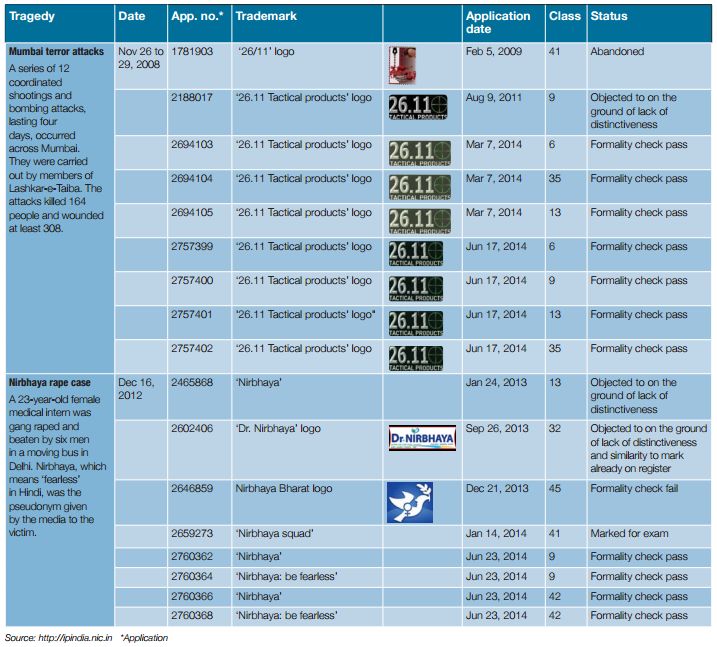- with readers working within the Advertising & Public Relations and Pharmaceuticals & BioTech industries
- within Strategy and Real Estate and Construction topic(s)
Social media have become an indispensable part of life. A phrase or slogan, often with a hashtag, can create awareness, allow people to share information, and organise action around a particular cause or issue. But popularised terms can also be used in the wrong way. This is highlighted by, for example, the sudden upsurge in the filing of trademarks closely connected to tragedies.
While the world is trying to wrap its head around the MH370 tragedy, some people have already tried to exploit it for their own benefit. On March 8, 2014, Malaysia Airlines flight 370 (MH370) disappeared, leaving no trace of the 239 lives on board, all of whom are presumed to be dead. Five days later, Aoan International filed an application with IP Australia for the trademark 'MH370'. The agency rejected the application on December 12, 2014, saying the mark 'MH370' lacks distinctiveness as the term is in circulation globally and is scandalous.
The Indian Trade Marks Registry is no stranger to receiving trademark applications related to tragedies. Eros International Media, an Indian motion picture production and distribution company, also applied for 'MH370'.
The Indian registry has received numerous other applications that make a mockery of national tragedies. Some of these are illustrated in the table opposite.
The table shows that the trademark applications were filed after the date of the tragedies. Most of them are in their initial stage of examination and have their status as either "formality check pass" or "marked for examination" on the Trade Marks Registry's website.
The registry has raised objections to the registration of such marks, but final decisions are pending. Further, section 9(2)(c) of the Trade Marks Act, 1999 provides that a mark shall not be registered if it comprises or contains scandalous or obscene matter.
The US Patent and Trademark Office (USPTO) has also been receiving similar applications. Some examples of these marks are enlisted below:
- 'MH17' The mark is related to the tragedy involving Malaysia Airlines Flight 17, which was shot down over Ukraine in July 2014. The USPTO has issued a non-final office action that refuses it on the grounds of failure to function as a service mark, false association, and being merely descriptive.
- 'I can't breathe' The application covers the last words spoken by Eric Garner, who died after an incident with the New York police. The USPTO has issued a non-final office action refusing the registration on the grounds of false connection and the mark being an informational slogan.
- 'Je suis Charlie' The application is for the rally slogan adopted as a message of condolence, outrage and defiance to show support for freedom of expression following the deadly attack on French satirical magazine Charlie Hebdo. It has yet to be examined.
Public and government Response
People around the world have widely criticised entities for viewing tragic events as an opportunity for commercial exploitation. The purported creator of the phrase "Je suis Charlie", Joachim Roncin, marked his outrage over the attempts to commercially exploit the phrase after more than 50 related trademark applications were filed in France alone.
After wrestling with their responsibility in this respect, the Office for Harmonization in the Internal Market and the National Institute of Industrial Property took a firm stance by releasing notifications that marks falsely indicating a connection to Charlie Hebdo shall be objected to on the ground of public interest and may be refused registration.
Sometimes entities having a direct connection with the origin of a mark file trademark applications with the intention of preventing third parties from commercially exploiting it. Cricket Australia filed a trademark application for the phrase '63 not out' with IP Australia. The trademark was filed after Australian cricketer Phillip Hughes died after being struck by a bouncer while on 63 runs during a match in November 2014, as a defensive strategy to prevent people from cashing in on and commercially exploiting the tragic incident.
The essential function of a trademark is to exclusively identify the commercial source or origin of goods or services. Trademarks based on tragedies fail to function as trademarks, as the public does not identify such marks/slogans with a single source; instead, people see these phrases as part of something larger than any single person or entity.

Originally published in World Intellectual Property Review May/June 2015
The content of this article is intended to provide a general guide to the subject matter. Specialist advice should be sought about your specific circumstances.


